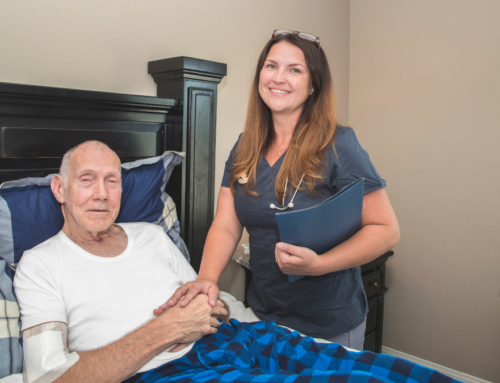
10 Things That Raise the Risk of Alzheimer’s Disease
Did you know there may be things you are doing that raise your risk of Alzheimer’s disease? While some risks, like age, are unavoidable, others can be reduced with a few simple changes to your lifestyle.
For many people, Alzheimer’s disease is nothing more than a vague fear – an illness that we may develop someday, but know little about. The truth is, however, that Alzheimer’s is becoming increasingly common, and it is important to be aware of the risk factors associated with the disease. In this blog post, we will take a look at 10 things that can raise your risk of developing Alzheimer’s. Keep in mind that these are just some of the potential risks – other factors such as age and genetics also play a role in whether or not someone develops the disease. But by being aware of these risks, you can take steps to reduce your chances of ever experiencing this terrible illness.
Smoking cigarettes
We all know that smoking is bad for our health, but did you know that it can also increase your risk of Alzheimer’s disease? Studies have shown that smokers are more likely to develop Alzheimer’s than non-smokers, and the risk increases with the number of years that a person smokes. If you smoke, quitting is one of the best things you can do for your health – and it may also help to reduce your risk of Alzheimer’s.
Too Much Alcohol Intake
While moderate alcohol consumption has been linked with some health benefits, heavy drinking can actually increase your risk of Alzheimer’s. If you drink heavily, consider cutting back – or better yet, quitting altogether.
Staying Socially Isolated
It’s never too late to make friends! It’s important to stay social as you age, as social interaction can help to keep your mind sharp. Studies have shown that people who are isolated from social interaction develop Alzheimer’s disease at a higher rate. So stay connected with your friends and family, participate in activities you enjoy – it will be worth the effort!
I’m sure many readers can attest: sometimes just being around others brings us happiness despite any difficulties they may bring along the way.
Not Enough Exercise
We all know that exercise is good for our health, but did you know that it can also help protect your brain from Alzheimer’s? Exercise helps to increase blood flow to the brain, which in turn helps to keep the mind sharp. Studies have shown that people who are physically active have a lower risk of developing Alzheimer’s than those who are inactive. Exercise helps to improve blood flow to the brain, which in turn helps to keep the brain healthy. That means any activity that gets your blood pumping and your heart rate elevated (to a healthy level). Be sure to talk to your doctor, so you know what activities are safe for you. Go ahead and get moving – your brain will thank you for it!
Eating an unhealthy diet
A healthy diet is important for our overall health, but it can also play a role in reducing our risk of Alzheimer’s disease. People who eat a diet high in saturated fats and cholesterol are more likely to develop Alzheimer’s than those who eat a healthy diet. So make sure to eat plenty of fruits, vegetables, and whole grains – and limit your intake of saturated fats and cholesterol.
Having diabetes
People with diabetes have a higher risk of developing Alzheimer’s disease than those who do not have diabetes. This is thought to be due to the damage that diabetes can cause to blood vessels, which can lead to reduced blood flow to the brain. If you have diabetes, it is important to control your blood sugar levels and to see your doctor regularly.
Having high blood pressure
High blood pressure is another risk factor for Alzheimer’s disease. It is thought that high blood pressure can damage blood vessels in the brain, which can lead to a reduction in cognitive function. If you have high blood pressure, it is important to see your doctor and take steps to control your blood pressure.
Having a history of head injuries
Head injuries can lead to a build-up of plaques in the brain, which are associated with Alzheimer’s disease. If you have had a head injury, it is important to see your doctor and to take steps to protect your brain from further injury.
Not getting enough sleep
Sleep is important for our overall health, but it is also critical for brain health. A lack of sleep can lead to a build-up of plaques in the brain, which are associated with Alzheimer’s disease. If you are not getting enough sleep, it is important to see your doctor and to take steps to improve your sleep habits.
Taking certain medications
Some medications, such as anticholinergics, can increase the risk of Alzheimer’s disease. If you are taking any medications, talk to your doctor about the potential risks and benefits. Ask your doctor if there are any alternative medications that you could take.
There is no known cure for Alzheimer’s disease, but there are treatments that can help to improve symptoms and slow the progression of the disease. If you are concerned about your risk of Alzheimer’s disease, talk to your doctor about ways to reduce your it. You may also opt to have an in-home care companion to help keep your mind sharp and to provide support as the disease progresses. Your silver companion can also provide support to your family during this difficult time.
No matter what you do, remember that Alzheimer’s disease is a complex illness, and there is still much we don’t understand about it. But by being aware of the risks, we can take steps to protect ourselves and our loved ones. For a no cost consultation, give us a call today at (678) 494-8129 or email us at info@SilverCompanions.com. We will make sure to get you the best possible care for your individual needs.





